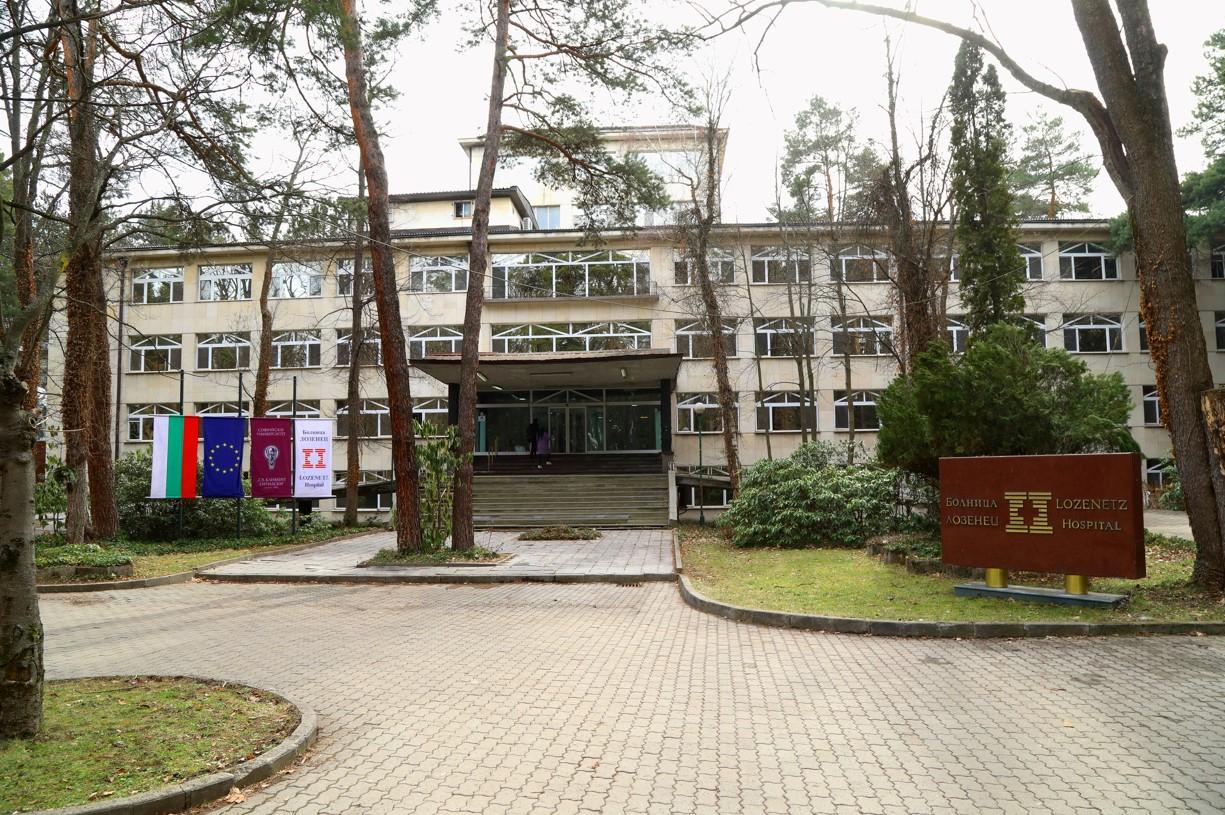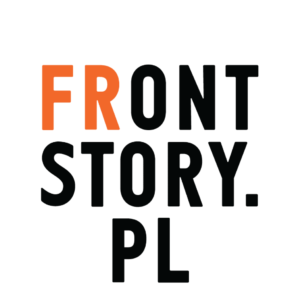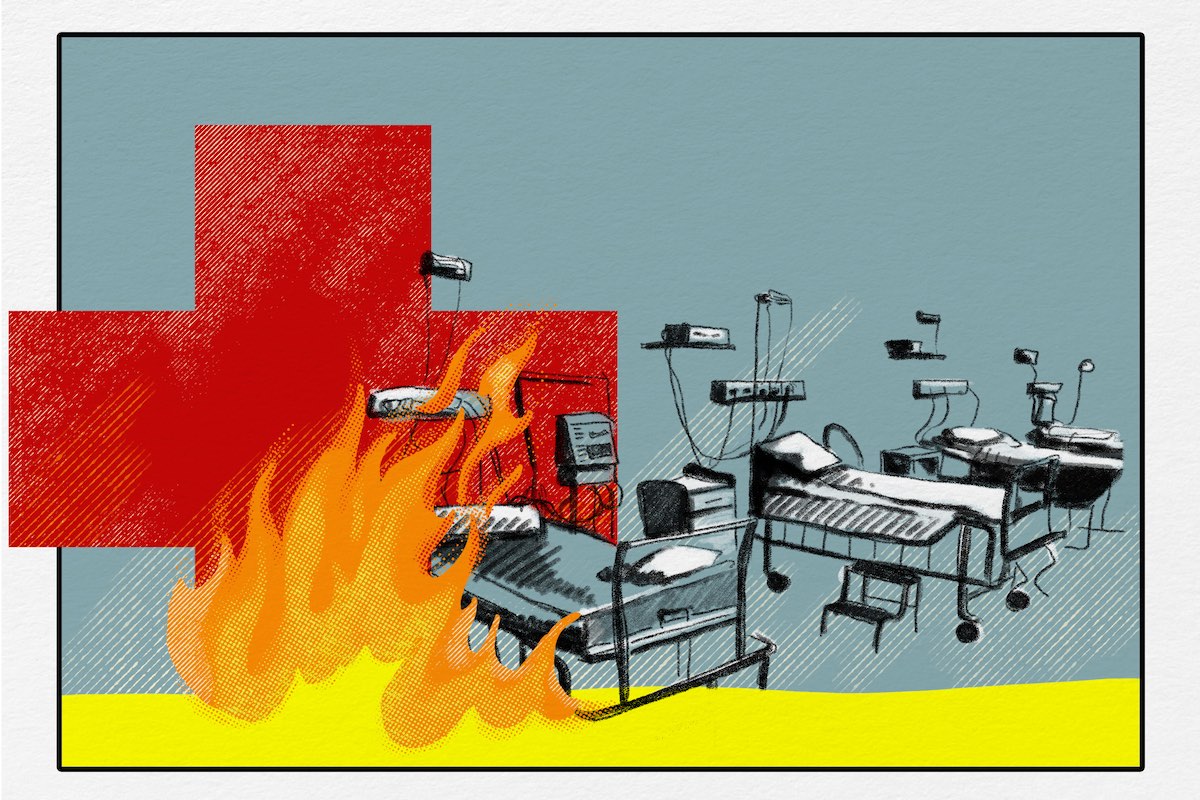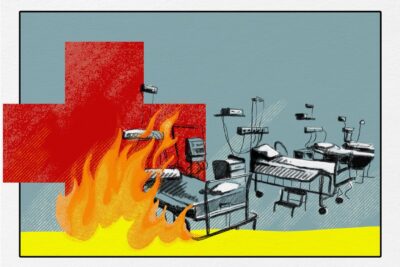CORRUPTION IN THE HEALTHCARE SECTOR (I)
Tens of thousands of Hungarians are on long medical waiting lists due to backlogs in a corrupt healthcare system. Investigative reporters found the Hungarian government of Viktor Orban spent hundreds of millions of euros on unused medical equipment during the COVID-19 pandemic, with public money ending up in the pockets of shady businessmen.
In Slovakia, members of parliament were accused of receiving bribes for poor healthcare reforms, and the Covid acquisition czar’s family got hundreds of thousands of euros as he manipulated public tenders to benefit specific private companies. In recent months, Romania investigative reporters uncovered gross mistreatment of seniors in retirement homes and that nearly half of Romanian hospitals are fire hazard risks for patients due to old electrical wiring. In Bulgaria, health insurance funds are siphoned using a fake hospitalizations scheme.
This collaborative newsletter is based on the research of seven investigative outlet members of The Organised Crime and Corruption Reporting Project: Investigace.cz (Czech Republic), Bird.bg (Bulgaria), Frontstory.pl (Poland), Rise Project (Romania), Investigative Center of Ján Kuciak – icjk.sk (Slovakia), Átlátszó (Hungary), Context Investigative Reporting Project (Romania). The team will explore each edition’s organized crime or corruption topic and showcase the most relevant facts.
Bribes for preferential treatment
Despite recent efforts by Hungary to address corruption, concerns and reported instances of corruption in the healthcare sector persist. One common form is bribing healthcare professionals and administrators for preferential treatment or specific services. This unethical practice has become deeply ingrained in Hungary’s healthcare system. Due to the sector’s low wages and unfavorable working conditions, many doctors and nurses accept under-the-table payments from patients wanting better care.
However, starting in 2021, Hungary has criminalized the giving and receiving of gratuities for medical treatments in an effort to combat this historic and pervasive form of corruption. In 2022, the National Protective Service (NVSZ), an anti-corruption police agency, reported eleven instances of exchanging gratuity money, ranging from €25 to 2,000.
The COVID pandemic has significantly influenced the expansion of private healthcare. This is primarily due to lengthy waiting lists becoming even longer, the decline in service quality offered by public institutions, and the increased inaccessibility of healthcare-related public services, including basic care and clinics. Official data indicates that the current number of patients on Hungarian healthcare waiting lists is nearly 40,000, and it is not uncommon for certain procedures to be scheduled after waiting periods exceeding six months. Atlatszo launched a countrywide survey to find out the true length of hospital waiting lists and how long people have to wait to receive care in a public institution. The survey showed patients wait months or over a year for crucial surgery.
Hundreds of millions of euros for unused Chinese ventilators
In the first year of the coronavirus pandemic, the Hungarian government, partly through state organizations and partly through companies with murky backgrounds, accumulated the largest ventilator capacity in the world in proportion to the population. The 17,000 ventilator machines cost Hungarian taxpayers more than HUF 300 billion (€772 million). In 2022, the government handed over hundreds of ventilators, free of charge, to countries including Czechia, Slovakia, Ukraine, and Serbia, as well as Bosnia, Lebanon, Jordan, Kyrgyzstan, Uganda, Moldova, and Tunisia.
Atlatszo.hu investigated a purchase where during the COVID-19 pandemic, the Hungarian Ministry of Foreign Affairs bought 1,000 ventilators from Celitron – a Dutch Israeli company based in Vác, Pest County – while hundreds of billions of forints worth of previously purchased Chinese equipment sat unused. Atlatszo.hu also found out that János Hiszem, a key Hungarian figure connected to the Azerbaijani Laundromat scandal, is one of the big beneficiaries of the pandemic business: his company supplied €79 million worth of ventilators and other medical equipment under a contract with the Ministry of Foreign Affairs and Trade of Hungary.
The Azerbaijani Laundromat uncovered by the OCCRP was a money-laundering scheme and slush fund used by Azerbaijani elites to disguise the origin of billions of dollars, purchase goods, and services, and make secret payments to companies and individuals in the European Union. It was also used to enrich powerful, well-connected Azerbaijani politicians directly.
A shady middleman for the covid Chinese vaccine
During the pandemic, Atlatszo also investigated various government institutions worldwide experiencing problems with fraudulent protective masks made by a specific Chinese producer. Even with that information, the Hungarian government purchased possibly more than 7 million pieces of the same product to hand out to doctors, medical workers, members of the police, and the military. The trading company with the contract received altogether $38.5 million for Covid-related supplies from the Hungarian government. We also found out, that after the government negotiated directly with the producer, Hungary bought Sinopharm vaccines against coronavirus through a middleman at a higher cost. The broker company had gone through a facelift right before the deal, moving its headquarters from Ploughland to Budapest city center. They also changed ownership, with the new owner having a history of shady business dealings.
Hundreds of thousands of euros for the covid acquisition czar
At the beginning of the Covid pandemic, the Slovak Administration of State Material Reserves, under the management of Kajetan Kičura – a personal friend of former Prime Minister Robert Fico – bought personal protective equipment (respirators, surgical drapes or protective gloves) from small and unknown companies.
In March 2020, the authority signed a purchase contract with Lacorp for a total value of €35 million for protective masks and respirators. Non-governmental organizations criticized the purchase as significantly overpriced. Despite that, the Administration of Material Reserves signed another contract with a newly established company, A-test. Despite having never done business with the state, this firm was supposed to provide it with disposable drapes for €13 million. In the end, the company did not deliver the drapes while refusing to return the advance payment of almost €4 million.
These purchases led to the dismissal of Kajetán Kičura by the new government shortly after it was established in 2020. A month later, the National Criminal Agency charged him with accepting bribes and legalizing the profits from criminal activity.
When the administration of material reserves concluded the dubious contracts, Kičura’s son bought two flats for hundreds of thousands without a mortgage loan. According to the prosecutor’s office, tenders for the purchase of medical devices such as respirators and surgical drapes were manipulated by Kičura, that allegedly cost the state up to €5 million in unnecessary expenses.
Kičura has been facing corruption charges in other cases from his eight-year-long era as the head of Administration of State Material Reserves. Police found 20 gold bricks worth 250 thousand Euro in his bank safe and identified suspicious operations in the accounts of Kičura’s father for more than 200 thousand Euro.
The Gorilla case: MPs accused of receiving bribes for healthcare reforms
Just a few days before Christmas 2011, an analysis of the Slovak Information Service, codename Gorilla, was leaked to the public. One of the biggest political and corruption scandals in the modern history of Slovakia showed how influential the financial group Penta, and it’s now former boss Jaroslav Haščák, could be involved in political and business circles and how they could profit from it. The financial group was also particularly interested in gaining influence in the healthcare sector.
According to the transcript of the Gorilla case, the Slovak secret service monitored and recorded Haščák’s secret meetings in a flat in Bratislava between 2005 and 2006. The former Penta boss was supposed to meet politicians and prominent personalities there. The leaked document revealed the behind-the-scenes deals, their contacts with high-level politicians, and allegations of corruption.
The Penta financial group has long been active in a number of important sectors, such as energy, real estate, and the media industry. The healthcare sector is one of the most important in its portfolio. Penta owns the country’s largest private health insurance company, hospitals, and pharmacies. As the Gorilla documents suggested, the financial group tried to gain control directly over the Ministry of Health. “For Penta, healthcare is a key sector, and it wants to do business there with a reasonable margin,” the document says in a section that allegedly captures a secret debate between Haščák and former Prime Minister Robert Fico.
The Gorilla special investigation team has, in several cases, obtained indications of criminal activity related to the case. They also investigated two allegations of bribery of MPs by Penta during the approval of health reforms introduced in 2004. Allegedly, the sums involved were 3 and 20 million Slovak crowns. The specialized team eventually closed both cases, concluding that no crime had been committed. In one case, however, the investigators admitted that “certain indications confirm that a number of MPs may have been corrupted in some way in the approval of the reforms”. The Gorilla case remains unsolved to this day. Jaroslav Haščák and Penta deny any wrongdoing.
A Romanian horror show with seniors grossly mistreated
At the beginning of 2023, Buletin de București and Centrul de Investigații Media published three investigations revealing ill-treatment in several centers for people with disabilities and the elderly in Ilfov, a county near the capital city. Running these centers were people connected to the Minister of Family and Equal Opportunities at the time, Gabriela Firea. Half a year later, DIICOT prosecutors uncovered that two organized crime groups operated the centers in Ilfov and were receiving support from public officials to continue their business.
The Minister of Labour, Marius Budăi, and the Minister of the Family, Gabriela Firea, resigned following these revelations, and several people in charge of the institutions responsible for controlling these centers were dismissed or suspended from their positions.
Electrical wiring in Romanian ICU pose a huge fire hazard
In recent years dozens of Romanians have died in fires at the country’s aging hospitals, with many of the deadly incidents attributed to electrical faults. The haunting aftermath images of charred patient beds, blackened wards, and the remains of burned bodies have been seared into the collective psyche — a symbol of a deeply troubled state healthcare system itself in need of critical care.
Context.ro an OCCRP member center spent months investigating this bleak phenomenon, including fighting — and winning — a legal battle against the Romanian Ministry of Health, which wanted to block information about the electrical infrastructure throughout the country’s hospitals from reaching the public. What Context.ro discovered is alarming: nearly half of the country’s state-run hospitals have intensive care units equipped with electrical wiring over two decades old. A criminal case that ended up with jail sentences confirmed that old and faulty wiring in the ICU of a children’s hospital was the main reason for a fire that tragically ended the life of six babies. Days after Context.ro revealed that many hospitals are in the same situation, the Romanian prime minister Marcel Ciolacu commented on the situation: “This is the public [healthcare] system at this time.”
Health insurance siphoned with fake hospitalizations.
Bulgaria’s healthcare system is reputedly underfinanced, unfriendly to patients, and often generates public scandals. The system includes Soviet times built public hospitals, new private hospitals, and medical centers. The National Health Insurance Agency (NZOK) finances both. The NZOK budget is some 3.5 billion € yearly, 2 billion from health insurance tax on salaries, and the rest from the State budget. But the patients are also required to pay a cash supplement in many cases, and this system is perceived as highly unjust and corrupted. In addition, Bulgaria has been struggling to introduce a modern electronic healthcare system for years resulting in poor health expenditure traceability. The COVID crisis unveiled the flaws of the Bulgaria healthcare system dramatically. Bulgaria spotted the second highest pandemic-related excess mortality worldwide, after Peru.
Investigative reporter’s revelations triggered several sound public scandals in recent years, including scandals related to stealing money from Covid funds.

Lozenetz Hospital, Bulgaria. Source: official www site of the institution
Investigative journalist Mirolyuba Benatova revealed in 2021 that a system was put in place in the governmental hospital “Lozenets”, allowing to siphon money from NZOK with fake patients. The Hospital declared fake hospitalizations and received an extra 200000 €. This is not a big sum compared to the general NZOK budget, but many hospitals are believed to use the same system countrywide. After the revelations, the Prosecution office started investigating, but no indictments have been filed up to the current date.
Expensive cancer treatments were invoiced twice
Investigation from Valya Ahchieva, published by Bivol, another OCCRP member center, revealed how the same pack of an expensive anticancer drug has been distributed to two different hospitals and invoiced twice to the NZOK. However, only one patient benefited from the drug; the other was injected with a placebo, and the expensive drug was sold abroad. The investigation demonstrated that this horrifying business is possible because of the lack of efficient electronic traceability. Here again, one case has been revealed, but it is believed the system is generalized, and the reexport of expensive drugs, depriving Bulgarian patients of normal treatment, is commonplace.
Illegal transplantations in the government hospital “Lozenetz”
The “Lozenets” hospital in Sofia has been for long years during Soviet times and, until the millennium years, the most luxurious State-owned medical institution. It had the status of a Hospital of the government and was viewed as a symbol of the injustice and the arrogance demonstrated by the ruling class.
In 2022 the newly appointed health minister Stoycho Katzarov ordered an audit of the Hospital and published a report revealing multiple wrongdoings, including illegal kidney transplantations from poor Ukrainian and Moldova citizens to wealthy patients from United Arab Emirates (UAE), Japan, and other countries. The donors fakely pretended they were close relatives to the patients – the only case accepted by the Bulgarian legislation for such transplants.
The investigative center BIRD.BG revealed the Secretary of the Council of Ministers Vesselin Dakov received a liver transplant after taking the place on the waiting list of another patient with more urgent needs. The investigation revealed a loophole allowing the patients to be reordered without following the system’s rules.
The heist of money from Covid funds
The SARS-COV-2 pandemic hit Bulgaria’s healthcare system badly and revealed roughly the nepotism and the corruption behind the apparent rules of conduct. At the pandemic’s beginning, the oligarch Kiril Domuschiev bypassed the system, sending the rare COVID patients to a specialized unit in the Military Hospital. He instead went to a private hospital and was put under quarantine, thus depriving other patients of appropriate care. Politicians and public figures received the best possible care in the most renowned Sofia hospital units while people were dying because of a lack of oxygen in small regional hospitals, etc, etc.

Planes bring personal protective equipment from China. Source: www.reserves.gov.sk
In the meantime, the State expenses on medical equipment raised multiple questions. An investigation by Bivol revealed a shipment from China of protective masks pretending to be medical-grade masks, but instead, the real product was a poor-quality FFP mask. The freight was paid with EU money, and the EPPO investigated the case. Another scandalous shipment from China included overpriced respirators, also revealed by Bivol. And the most curious case was the so-called donation of medical supplies from UAE which turned out to be a shipment of… dates.








